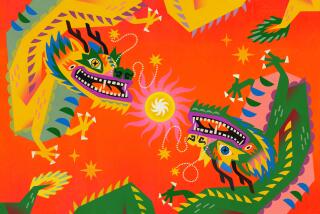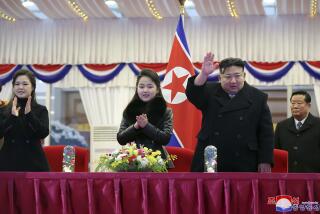The Scions Still Rise in China
BEIJING — “Dragons beget dragons,” Chen Xiaotong enjoyed telling his friends.
His father, former Beijing Mayor and Communist Party leader Chen Xitong, was a powerful dragon on China’s political scene. And Chen Jr., one of the privileged offspring of senior party leaders known as the “princeling faction,” played his filial connection for all it was worth.
By the time he was 30, young Chen was figurehead director of two companies and general manager of one of Beijing’s biggest hotels. He drove a BMW, entertained hundreds at lavish banquets and hobnobbed with the French ambassador at Maxim’s restaurant in Beijing. Foreign business people seeking to meet senior Chinese officials were advised to see him first. His reported price for arranging an audience: $93,000 a shot.
In some ways, the story of a spoiled son taking advantage of his father’s position is as old as China. One of the great evil figures in Chinese literature is Young Master Gao, adopted son of Marshal Gao Qiu, commander of the Imperial Guard in the classic 14th century novel “Outlaws of the Marsh.” The “young scoundrel made full use of his foster father’s influence in the Eastern Capital,” the authors of the epic wrote. “His favorite pastime was despoiling other men’s wives.”
But the ancient tale takes on new meaning in modern China, where Communist leaders have pledged to root out and destroy all vestiges of hereditary privilege. According to a 1991 Communist Party report, there are 3,000 to 5,000 taizi--”princelings”--who enjoy prominent posts in government, the military or state-owned enterprises. Nepotism permeates every level of society. Far from being eliminated, it has taken root in a way that evokes China’s imperial past.
As a new generation of leaders prepares to take power, the princeling faction represents a political liability capable of arousing mass indignation against the ruling elite.
Because the world of the princelings remains an extremely touchy subject for the Chinese regime, it still goes largely unreported in China. Its influence on life is like that of a dark planet that can be detected only by its gravitational effects on other spheres.
In a rare exception to this rule, details of Chen’s high-rolling life appeared in a recent article in Southern Weekend, a Communist Party newspaper published in Guangdong province. Written under a pseudonym by a former business associate of Chen, the article offered a rare peek inside the world of China’s elite families.
The Guangdong newspaper story about Chen probably would never have been written if his father had not been implicated last summer in a massive corruption scandal and stripped of his seat on the seven-member Standing Committee of the Chinese Communist Party.
“The intended message of such articles,” said Andrew J. Nathan, a China scholar at Columbia University in New York, “is that corruption is being caught, exposed, punished; that the authorities under [Chinese President] Jiang Zemin are cracking down; that they are ‘shocked, shocked’ that corruption is going on here.
“However,” he added, “an unintended message of such articles is somewhat the opposite: that corruption is the common way of doing business among the higher-ups; that it is very widespread; that this guy got away with it for a long time and a lot of people must have known about it; and that he only gets exposed after his houtai, his father, falls from power.”
Reaching to the Top
The ranks of princelings reach to the pinnacle of the ruling hierarchy: Deng Pufang and Deng Zhifang, sons of 91-year-old paramount leader Deng Xiaoping, have been involved in controversial high-stakes business dealings involving state firms.
Deng Pufang, 52, partially paralyzed as the result of injuries suffered during the 1966-76 Cultural Revolution, has official status as chairman of the Chinese Federation for the Disabled. Previously, he was involved in a failed state-owned company.
Deng Zhifang, 43, is chief executive of a Hong Kong-based construction company that figured in a major corruption scandal.
A daughter, Deng Nan, 49, is a vice minister in charge of the State Science and Technology Commission. Son-in-law He Ping is director of the People’s Liberation Army Armament Department, in charge of money used to buy weapons for the world’s largest army.
Meanwhile, former revolutionary leader Bo Yibo has one son who is mayor of Dalian, one of China’s most important port cities; another son once headed Beijing’s Tourism Ministry. One of his sons-in-law is ambassador to Denmark.
Chen Yun, the powerful senior leader who died last year, sired perhaps the most powerful princeling of all: His son, Chen Yuan, is deputy governor of the People’s Bank of China, the country’s central bank. He is often mentioned as the nation’s future economic czar. As for Chen Yun’s daughter, she heads a major joint-venture state investment firm.
The list goes on.
Defenders of the system contend that the success rate of the political progeny is largely due to their superior education. And to an extent, this is true. Many princelings are graduates of special schools set up for children of Zhongnanhai, the residential compound of the Chinese leadership. It sits on the western edge of the Forbidden City in central Beijing. Other princelings have benefited from elite foreign educations unavailable to most Chinese.
Some of the more vocal princelings contend that China is unfairly criticized for nepotistic practices that exist around the world.
In an interview with a Hong Kong-based news agency, Dalian Mayor Bo Xilai, one of the country’s most prominent princelings, argued that the practice of sons following their fathers into government is not unknown, even in America. Aren’t two sons of former President Bush prominent politicians? Why should China be judged differently?
What he did not mention, of course, is that George Bush Jr. and Jeb Bush sought political posts through popular elections that do not exist in China. In 1994, George Jr. was elected governor of Texas; Jeb lost narrowly in Florida’s gubernatorial election.
In fact, the existence of privileged offspring in China is a constant sore point and one of the main issues that fueled the 1989 democracy protests in Tiananmen Square.
Like Royals-Watching
Although family connections are seldom mentioned in the official press, tracking the business and government careers of the children of top leaders is a popular parlor game. The historical significance is not lost on ordinary people, who refer privately to the offspring as yanei--meaning children of the local magistrate and a term dating to the era of “Outlaws of the Marsh,” China’s own Robin Hood epic.
“These people are a new species of large rat who rely on local state enterprises, this great granary, to fatten themselves,” the normally staid Beijing-based magazine Science and Technology Digest said of the children of Communist leaders who have parlayed family connections into power.
Most of this criticism is general and mentions no specifics or, following another common Chinese journalistic practice, uses an ancient historical example to illustrate a modern problem.
Sensitive to the smoldering public rage over the emergence of this hereditary privileged class, Communist Party officials periodically announce programs to curb nepotism.
In late January, Wei Jianxing, head of the party’s Central Discipline Inspection Commission, issued new directives to prevent spouses, children, friends and relatives of friends from benefiting from official largess. Central party leaders will be asked to set an example, Wei said. Ministerial-level officials will be sent to the provinces and cities to investigate cases of nepotism.
But such efforts are generally viewed cynically.
“When a man becomes an official,” begins an old saying still popular today, “his wife, children, dogs, cats and even chickens fly up to heaven.”
China’s revolutionary founders strove to break down the system revolving around clans, nepotism and inherited privilege that characterized centuries of dynastic rule. The late Chairman Mao Tse-tung, son of a landed peasant farmer in Hunan province, urged his Communist Party cadres to place the state’s interests above those of their families. But by the time the generation after Mao’s had moved into power, a new “red aristocracy” had already been deeply re-embedded into the body politic.
Children of revolutionary figures enjoyed power and status equal to offspring of imperial ministers. Several top leaders today--including President Jiang and Premier Li Peng--owe at least part of their present prominence to family connections.
Jiang was raised in the family of an uncle who was an early Communist leader in Jiangsu province. Li is the adopted son of the late Premier Chou En-lai, who was second only to Mao in the Chinese revolutionary pantheon.
A Show of Propriety
In times of political sensitivity, Beijing leaders have highlighted cases of blatant abuse of privilege among princelings to demonstrate the government’s resolve to root out corruption, even in the most powerful families.
In the early 1980s, when Deng was consolidating his power, the grandson of Zhu De, the former National People’s Congress chairman and Red Army marshal, was put on trial and executed for economic crimes. The elder Zhu was dead when the execution took place and no longer able to protect his family.
In 1986, former Communist Party General Secretary Hu Yaobang campaigned to eliminate privilege among children of senior Communist cadres. Hu’s effort to clean up nepotism quickly backfired, eventually leading to his resignation in 1987. Critics joked that he made the mistake of “hunting tigers in the Year of the Tiger.”
But significantly, the failed campaign won Hu great respect. His death in April 1989 sparked the Tiananmen movement.
Today, as Deng’s health continues to fade and China finds itself facing a succession struggle, examples have been made of two other taizi.
In both cases, it should be noted, the fathers had been purged and could no longer protect their offspring. “To attack the son is to attack the father,” said Columbia scholar Nathan, “and you can’t do that until you neutralize the father.”
The first case involved the arrest early last year of Zhou Beifang, 42, the son of senior state industrial chief Zhou Guanwu, long a political ally of Deng’s. The elder Zhou, 77, was chairman of the giant Shougang Group (Capital Iron and Steel Corp.), based in the western suburbs of Beijing.
The younger Zhou was chairman of Shougang Concord Grand, a Hong Kong subsidiary of Shougang that lost millions of dollars in controversial deals, including the purchase of an iron ore mine in Peru for $120 million. After the elder Zhou resigned last February, central government anti-corruption officials were free to arrest the son, who remains in custody in Beijing awaiting sentencing for economic crimes.
Most significant, the troubled Hong Kong subsidiary’s chief executive was none other than Deng Zhifang, youngest son of Deng Xiaoping. But as long as the senior leader remains alive, few expect authorities to move against young Deng.
Tales of Exploits
The latest, most highly publicized case involves Chen Xiaotong, subject of the Southern Weekend expose. For years, tales of his exploits had circulated in the capital. According to one rumor, he was the driver in a fatal hit-and-run accident.
The article gave details of the princeling’s expensive lifestyle, including a carousing trip to Hawaii and a private collection of pornographic films.
At the end of the article, the author paused to reflect philosophically on the fallen princeling’s life: “If his parents had educated him more strictly; if he had the wisdom of self-knowledge; if he had managed to retain some rationality and self-restraint in the face of his cornucopia-like material desires, then Chen might not have gone so far . . . inviting his own downfall at the age of 38.”
More to Read
Sign up for Essential California
The most important California stories and recommendations in your inbox every morning.
You may occasionally receive promotional content from the Los Angeles Times.










